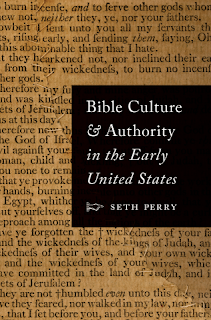 He applied the “Page 99 Test” to his new book, Bible Culture and Authority in the Early United States, and reported the following:
He applied the “Page 99 Test” to his new book, Bible Culture and Authority in the Early United States, and reported the following:Page 99 of Bible Culture and Authority in the Early United States lands in Chapter 4, which happens to be my favorite chapter (so, score one for the Page 99 Test!). The book argues that in early America the Bible was not a “source” of authority, as is often said, but rather a site of authority: a cultural space for editors, commentators, publishers, preachers, and readers to cultivate authoritative relationships. “The Bible” is best thought of not as a specific text, but as a set of relationships sustained by a universe of cultural practices and assumptions. Chapter Four – “‘Write These Things in a Book’: Scripturalization and Visionary Authority” -- shows that this extended to new scripturalized texts that participated both in the resonance of biblical content (they cited the Bible) and in the practices and assumptions of Bible reading as a cultural practice (they were treated like bibles). This part of the chapter is about The Vision of Isaac Childs, a Quaker visionary text originating in 1757 that circulated widely in both print and manuscript throughout the nineteenth century (it was last published in 1929). Childs’s vision was copied, recopied, edited, translated, annotated, and commented upon over the course of well over a century – I’ve seen eighteen manuscript versions and copies of nine printed editions. Page 99 is the beginning of a section pointing out that the significance of Childs’s vision changed through all of this activity even though the text itself mostly didn’t: the anonymous editor of an 1826 edition, for example, added footnotes explaining the vision and applying it to events in his or her own time, far distant from Childs’s own: “While the text remained more or less consistent with a manuscript tradition going back more than seventy years, the novel annotations demonstrated the flexible terms for making meaning in a scripturalized environment.” It’s this constellation of practices that constitutes scripturalization; this is what “bible culture” was all about in the early United States.Learn more about Bible Culture and Authority in the Early United States at the Princeton University Press website.
Writers Read: Seth Perry.
--Marshal Zeringue



